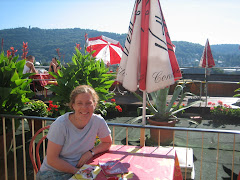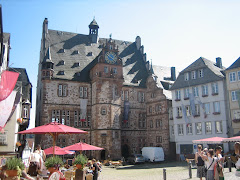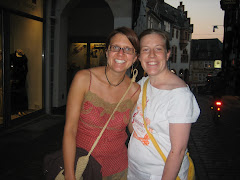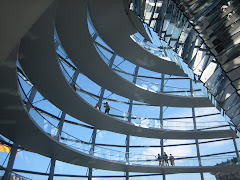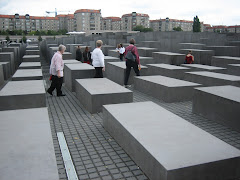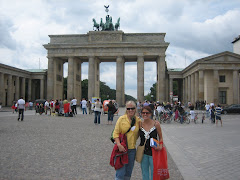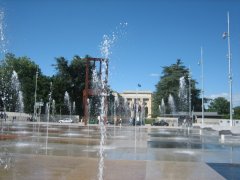Conflict. Violence. Famine. Displaced people. Illegitimate governments. Chaos. When the United Nations sends in a peacekeeping mission to clean up the aftermath of a conflict, it is a Gargantuan task.
This week, my supervisor, retired British military Col. Mike Pope required members of the Swiss Diplomat program to hypothetically solve the problems in the imaginary country, Merango. The current "President" had appointed himself. With military factions rising up and fighting throughout the country, the nation was in a state of disarray. Also, people were fleeing for safety without food while roads and airports were demolished. The "leader" of this nation finally called upon the UN peacekeeping missions.
The Swiss participants in this course were assigned the task of organizing this exercise.
But, where does one start in tackling a conflict this large?
Embarking on the task, the participants actually had to begin at the conclusion, by envisioning a strategic end state. What should the country at peace look like? How should it be ruled? What steps needed to be taken to get there? Which projects required simultaneous action and which were straightforward?
Quite obviously, the potential solutions varied but participants found that the best approach was breaking down the problem into tracts, such as humanitarian, political, economic, military and media. You can imagine that there was no silver bullet solution. Projects had to be aimed towards solutions and orderly. For instance, infrastructure had to be developed before supplies could be transported. Meanwhile, military factions needed to be controlled or stopped and mines removed. All while the government faced reorganization.
The task showed me that peacekeeping is much more difficult than operating at the city, state or federal government level. Not only do the tracts need to be coordinated, the various leaders, volunteer entities (Red Cross, Bread for the World, Catholic Charities, etc.), and military must all work together to accomplish the feat. Most importantly, the inhabitants must have a say in the peacebuilding process as they are the ones living in the state. Needless to say, promoting peace is a tedious task!
Friday, June 29, 2007
Tuesday, June 26, 2007
Sailboats as far as the eye could see
This weekend, I had some time alone in the city of Genevea. I like to travel this way, because you can do things at your own pace. If something is interesting, take more time, if not, move on!
On Saturday, I strolled through the park, enjoying the sunny day, crossed the historic bridge, and saw the famous Geneva Jet D’Eau, up close. I followed this up by a relaxing sail across Lake Geneva on an open air boat.
Sunday was a day of music at Geneva’s yearly celebration, Fête de la Musique. The city converts its parks and roadways into stages for all types of music-rap, punk, hip hop, jazz- you name the genre, it’s there! First, I saw a children’s choir outside of the cathedral. They performed fun, funky songs. Next, I went to a historic theatre for a piano recital. The pianist had his baby sitting on his lap, adding to the music. A bit different, but interesting. He then invited the audience to participate. After much pestering, one brave sole went forward. She was phenomenal! It was amazing to see how he added to her talents and complimented her piece with his own music. Next, I heard Latin Jazz on stage in the park and saw the King of Rock and Roll, Elvis Presley himself, dancing in the street. (Although, he was a pretty skinny Elvis.) I ended the day by going to my first opera. It was simply amazing. By no means was this a traditional opera, it was much more modern. There were four main characters that became two couples. It was all in French so some parts were difficult to understand, but fascinating and beautiful.
Finally, I met the other sisters in our family here for a Sunday meal. Emilie is a student at HEI, the international school. We had a great conversation about world relations and how our studies differed. Being in America is very different than studying policy in Europe. I would argue that the Europeans have a much stronger understanding of the world. They know what is happening in many neighboring countries and can name most world Presidents. I still have trouble with the geography and locating all the countries! The discussion made me reflect on my own studies in grade school, college and at the Humphrey Institute. I some regards I think that the U.S. is very isolated in what is taught, which ultimately is reflected in our foreign policies. We don’t necessary think about other world countries (unless there was or is a conflict with them) in our studies. I don't remember getting much current news about our geographical-neighbors, Canada and Mexico, either. In many regards, I think land-locked isolation hinders us. I don’t think we can even compare to the world knowledge that many students learn in grade school here. The U.S. is also very behind in teaching languages. (Litchfield offered 2 choices-German and Spanish, whereas, Virginie, 15, here is learning German, Latin and English. Of course, she also has classes in French and writing.) I definitely wish I had more training in other languages and would give anything to have had schooling at an immersion school. (Cinnamin and Mom-maybe you can start teaching them in preschool at ECFE!)
On Saturday, I strolled through the park, enjoying the sunny day, crossed the historic bridge, and saw the famous Geneva Jet D’Eau, up close. I followed this up by a relaxing sail across Lake Geneva on an open air boat.
Sunday was a day of music at Geneva’s yearly celebration, Fête de la Musique. The city converts its parks and roadways into stages for all types of music-rap, punk, hip hop, jazz- you name the genre, it’s there! First, I saw a children’s choir outside of the cathedral. They performed fun, funky songs. Next, I went to a historic theatre for a piano recital. The pianist had his baby sitting on his lap, adding to the music. A bit different, but interesting. He then invited the audience to participate. After much pestering, one brave sole went forward. She was phenomenal! It was amazing to see how he added to her talents and complimented her piece with his own music. Next, I heard Latin Jazz on stage in the park and saw the King of Rock and Roll, Elvis Presley himself, dancing in the street. (Although, he was a pretty skinny Elvis.) I ended the day by going to my first opera. It was simply amazing. By no means was this a traditional opera, it was much more modern. There were four main characters that became two couples. It was all in French so some parts were difficult to understand, but fascinating and beautiful.
Finally, I met the other sisters in our family here for a Sunday meal. Emilie is a student at HEI, the international school. We had a great conversation about world relations and how our studies differed. Being in America is very different than studying policy in Europe. I would argue that the Europeans have a much stronger understanding of the world. They know what is happening in many neighboring countries and can name most world Presidents. I still have trouble with the geography and locating all the countries! The discussion made me reflect on my own studies in grade school, college and at the Humphrey Institute. I some regards I think that the U.S. is very isolated in what is taught, which ultimately is reflected in our foreign policies. We don’t necessary think about other world countries (unless there was or is a conflict with them) in our studies. I don't remember getting much current news about our geographical-neighbors, Canada and Mexico, either. In many regards, I think land-locked isolation hinders us. I don’t think we can even compare to the world knowledge that many students learn in grade school here. The U.S. is also very behind in teaching languages. (Litchfield offered 2 choices-German and Spanish, whereas, Virginie, 15, here is learning German, Latin and English. Of course, she also has classes in French and writing.) I definitely wish I had more training in other languages and would give anything to have had schooling at an immersion school. (Cinnamin and Mom-maybe you can start teaching them in preschool at ECFE!)
Wednesday, June 20, 2007
Ice cream by the sea and learning about olympics
Lausanne is the home of the National Olympic Stadium. I went there this week with Preeti and Heather, two other students here from the University of Minnesota. Preeti is studying medicine while Heather is in the same program as me-Masters of Public Policy.
We really enjoyed the museum and learned much about how the Olympics began. Every athlete is expected to respect others from different countries. It made us realize how much world relationships are omnipresent in Switzerland. Getting the countries together, regardless of government and world policies is a major feat. It seems to be a national motto around here.
The three of us also had Cheese fondue by the lake and also saw the replica of the Cathedral of Notre Dame. It was beautiful. I had previously studied this in an art history class at Bemidji State University. We discussed the features and the interior and how such magnificent architecture could stand with high ceilings.
On Saturday, Virginie, my sister here, had a tennis event in Neuchâtel. This is a city on a mountaintop with a lake in the valley. It was glorious. While she played tennis, I explored the city. I went to a museum to learn about mammoths, did some shopping and had ice cream by the lake.
The best part of the weekend was seeing Shakespeare’s “A Midsummer’s Night Dream” performed outdoors in the area Château, or castle. I think it was my first outdoor performance. It was amazing!
We really enjoyed the museum and learned much about how the Olympics began. Every athlete is expected to respect others from different countries. It made us realize how much world relationships are omnipresent in Switzerland. Getting the countries together, regardless of government and world policies is a major feat. It seems to be a national motto around here.
The three of us also had Cheese fondue by the lake and also saw the replica of the Cathedral of Notre Dame. It was beautiful. I had previously studied this in an art history class at Bemidji State University. We discussed the features and the interior and how such magnificent architecture could stand with high ceilings.
On Saturday, Virginie, my sister here, had a tennis event in Neuchâtel. This is a city on a mountaintop with a lake in the valley. It was glorious. While she played tennis, I explored the city. I went to a museum to learn about mammoths, did some shopping and had ice cream by the lake.
The best part of the weekend was seeing Shakespeare’s “A Midsummer’s Night Dream” performed outdoors in the area Château, or castle. I think it was my first outdoor performance. It was amazing!
Sunday, June 17, 2007
The UN, it needs no further introduction
This week, I took a tour of the United Nations. What a great concept, countries of the world collaborating to end war? All countries in the world, except the Vatican, are members.
I learned some very interesting statistics on the tour. Did you know that the United Nations costs $12 billion to run annually? Compare that with the $850 billion that the world is spending on war. It really makes you wonder where our priorities lie.
My favorite part of the tour was seeing the paintings (back to that in a minute) in a conference room where the UN Security Council meets. This is the body that discusses war, proliferation and security. It contains 15 members, 10 are temporary and 5 seats are permanent—they include the United States, Russia, China, France and the United Kingdom. Each permanent member has the power to veto a resolution, just by voting against it. This means a vote could be 14 to 1 and the resolution would not pass. That seems like a bit too much power if you ask me for the permanent members. Could you imagine if Congress worked this way?
The paintings in this room depicted the various stages of war. The victors celebrated their win while those defeated watched over the dead. One on the losing side stood with his arms raised, vowing that the lives lost would not be forgotten and he would rise up against the victors. This depicted the cycle of war. On the far right side of the room, a baby was raised up in a peaceful society. This was to represent the first child born into a post-conflict, peace-abiding society. Oh, I dream that we will see this day.
Another interesting fact is that President Woodrow Wilson’s name appears many places in Geneva, on hotels, signs, and a street. Why? He is credited with created the United Nations, in 1945. As you may know, the intent was to find peaceful solutions to world conflicts while avoiding war.
Stay tuned, this weekend’s journey is to Lausanne, where the Notre Dame Cathedral and Olympic stadium are located. It should be nice.
I learned some very interesting statistics on the tour. Did you know that the United Nations costs $12 billion to run annually? Compare that with the $850 billion that the world is spending on war. It really makes you wonder where our priorities lie.
My favorite part of the tour was seeing the paintings (back to that in a minute) in a conference room where the UN Security Council meets. This is the body that discusses war, proliferation and security. It contains 15 members, 10 are temporary and 5 seats are permanent—they include the United States, Russia, China, France and the United Kingdom. Each permanent member has the power to veto a resolution, just by voting against it. This means a vote could be 14 to 1 and the resolution would not pass. That seems like a bit too much power if you ask me for the permanent members. Could you imagine if Congress worked this way?
The paintings in this room depicted the various stages of war. The victors celebrated their win while those defeated watched over the dead. One on the losing side stood with his arms raised, vowing that the lives lost would not be forgotten and he would rise up against the victors. This depicted the cycle of war. On the far right side of the room, a baby was raised up in a peaceful society. This was to represent the first child born into a post-conflict, peace-abiding society. Oh, I dream that we will see this day.
Another interesting fact is that President Woodrow Wilson’s name appears many places in Geneva, on hotels, signs, and a street. Why? He is credited with created the United Nations, in 1945. As you may know, the intent was to find peaceful solutions to world conflicts while avoiding war.
Stay tuned, this weekend’s journey is to Lausanne, where the Notre Dame Cathedral and Olympic stadium are located. It should be nice.
Saturday, June 9, 2007
A Birthday in Geneva
I had the most wonderful birthday in Geneva. It was perfect. Before leaving, my grandparents gave me a card which I opened in the morning. Claudine, my host mom also greeted me with a birthday hug. It was all very nice. At work, Christina, a fellow Minnesotan (she was born in Edina) took me out for a danish and coffee. My fellow intern/Duke participant, Dan, also stopped by to offer to take me to lunch. So many wonderful warm wishes.
I also had birthday greetings from home. Mike, my boss and Miriam, my in-direct supervisor took me to lunch at the park. We ate outside by a carousel overlooking Lake Geneva. They also gave me a wonderful card.
After work, my family- Claudine, Pierre-Alain, and Virginie - took me to have birthday supper at the local castle. Who knew I would celebrate my birthday like this? It was so fantastic. I ate two new dishes--a salad with liver and berries, and pork with potatoes, pear and sauce. Both were simply delicious, very unlike any American dish I have had. When we finished eating, we climbed up the castle and overlooked the Lake at night. It was breathtaking with the mountains and France in the backdrop. I am beginning to love Europe and the people here. I ended the night opening a card from my parents back home and a gift from my family here. All so nice.
On the work/school front, I met fellow interns at our weekly Thursday night event. After talking with them, I really know that my placement is so ideal for me. I really believe in what we are doing at GCSP. The organization is sponsored by the Swiss government and has 35 participant countries. Each government sends a participant to various courses held throughout the year. Then, GCSP invites experts in to teach on their various topics. The intent is that when people learn together and look at issues through other country's lenses, they better understand viewpoints and have a stronger basis for foreign policy decisions. In that context, I attended a lecture this week on the future challenges of Africa. It was simply fascinating. I also thoroughly enjoy researching a topic during the day and apply my research in conversations with participants. It just goes to show that when things are meant to be, they work out perfectly. :)
And, thanks Dad for my birthday "supper" with my photo. Hope you enjoyed it. Ha ha. Sorry I didn't eat too much. More cake for you, right?
I also had birthday greetings from home. Mike, my boss and Miriam, my in-direct supervisor took me to lunch at the park. We ate outside by a carousel overlooking Lake Geneva. They also gave me a wonderful card.
After work, my family- Claudine, Pierre-Alain, and Virginie - took me to have birthday supper at the local castle. Who knew I would celebrate my birthday like this? It was so fantastic. I ate two new dishes--a salad with liver and berries, and pork with potatoes, pear and sauce. Both were simply delicious, very unlike any American dish I have had. When we finished eating, we climbed up the castle and overlooked the Lake at night. It was breathtaking with the mountains and France in the backdrop. I am beginning to love Europe and the people here. I ended the night opening a card from my parents back home and a gift from my family here. All so nice.
On the work/school front, I met fellow interns at our weekly Thursday night event. After talking with them, I really know that my placement is so ideal for me. I really believe in what we are doing at GCSP. The organization is sponsored by the Swiss government and has 35 participant countries. Each government sends a participant to various courses held throughout the year. Then, GCSP invites experts in to teach on their various topics. The intent is that when people learn together and look at issues through other country's lenses, they better understand viewpoints and have a stronger basis for foreign policy decisions. In that context, I attended a lecture this week on the future challenges of Africa. It was simply fascinating. I also thoroughly enjoy researching a topic during the day and apply my research in conversations with participants. It just goes to show that when things are meant to be, they work out perfectly. :)
And, thanks Dad for my birthday "supper" with my photo. Hope you enjoyed it. Ha ha. Sorry I didn't eat too much. More cake for you, right?
Wednesday, June 6, 2007
Going black and blue in a beautied city
When I was little, I spent a weekend away from home with friends of the family. I had caught a really bad cold and kept saying "I got a runny nose" to ask for help wiping it. It is now the family joke. Well, here is a new one, "I have a black eye." First ever. Now, I must back up to tell you the story.
As you can imagine, things were busy before I left for Geneva. I had no idea how much to pack for 3 months. Inevitably, I found last minute things to add. Quickly, before my sister and I left for the airport, I threw an extra pair of jeans in my suitcase, which was already in the car. After putting things inside the luggage, I lifted my head fast and smacked my eye on the car door. What a mess--it was bloody and hurting. Needless to say, it was interesting asking the flight staff for ice for my eye, arriving to meet my Swiss family and starting work with a black eye. (My work ID and United Nations passes are really, ugh, interesting.) Hopefully, things only get better from here.
Now, onto the good stuff. Geneva has been amazing. I have seen the historical part of the city, visited the government building, walked by the lake in town and been to the park across from my work. My family is really great and have been wonderful guides for me. I am learning SO much about Geneva, Switzerland, Europeans and the general culture.
I have been pretty self-sufficient thus far. Geneva seems pretty easy as the amenities are similar to the U.S. Transportation is great--I take the train to and from work each day. It is a quick 20 minute ride from home to GCSP. Food is similar with many more fruits, vegetables and, of course, lots of cheese and wine.
On the work front, I am learning a lot, even though it is only day 3. GCSP is part of the United Nations, as an affiliate member and is geographically down the road. In the office, we literally work with people from around the world. Participants in GCSP programs are sent to Geneva by the governments of their countries. It is a great place to be, conversations have been fascinating. In my short-term of duties, I have started by researching the field training exercise we will be completing during the peace training course in September, and learned more about NATO and the Council of Europe. Specifically, how both organizations work on building peace through mediation.
I definitely have a lot more to see, do and learn here in Geneva.
As you can imagine, things were busy before I left for Geneva. I had no idea how much to pack for 3 months. Inevitably, I found last minute things to add. Quickly, before my sister and I left for the airport, I threw an extra pair of jeans in my suitcase, which was already in the car. After putting things inside the luggage, I lifted my head fast and smacked my eye on the car door. What a mess--it was bloody and hurting. Needless to say, it was interesting asking the flight staff for ice for my eye, arriving to meet my Swiss family and starting work with a black eye. (My work ID and United Nations passes are really, ugh, interesting.) Hopefully, things only get better from here.
Now, onto the good stuff. Geneva has been amazing. I have seen the historical part of the city, visited the government building, walked by the lake in town and been to the park across from my work. My family is really great and have been wonderful guides for me. I am learning SO much about Geneva, Switzerland, Europeans and the general culture.
I have been pretty self-sufficient thus far. Geneva seems pretty easy as the amenities are similar to the U.S. Transportation is great--I take the train to and from work each day. It is a quick 20 minute ride from home to GCSP. Food is similar with many more fruits, vegetables and, of course, lots of cheese and wine.
On the work front, I am learning a lot, even though it is only day 3. GCSP is part of the United Nations, as an affiliate member and is geographically down the road. In the office, we literally work with people from around the world. Participants in GCSP programs are sent to Geneva by the governments of their countries. It is a great place to be, conversations have been fascinating. In my short-term of duties, I have started by researching the field training exercise we will be completing during the peace training course in September, and learned more about NATO and the Council of Europe. Specifically, how both organizations work on building peace through mediation.
I definitely have a lot more to see, do and learn here in Geneva.
Subscribe to:
Posts (Atom)
